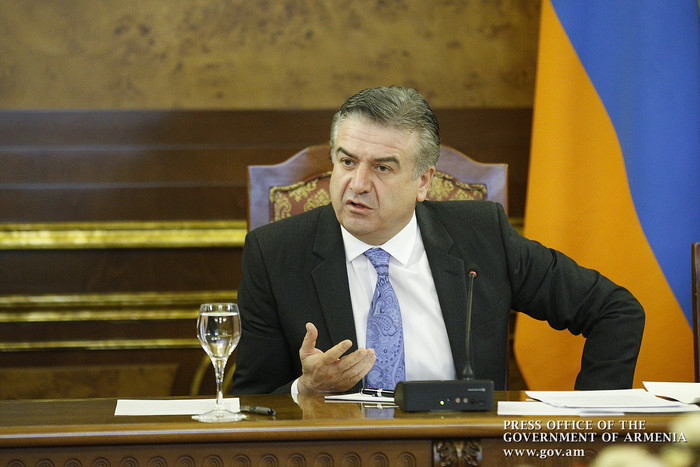A Cabinet sitting was held, chaired by Prime Minister Karen Karapetyan. Before proceeding to the agenda, the Prime Minister gave a number of instructions.
The Premier’s first instruction calls for a simplified procedure to be followed by central or local self-governing authorities in issuing permits and other documents regarding the use of limited resources. “In order to engage in economic activity, business entities are required to obtain permits, endorsements, quotas and other documents for getting access to some limited resources (rental of public spaces, use of water resources). To this end, businesses have to apply to competent State or local self-governing bodies.
The studies conducted by the State Commission for the Protection of Economic Competition testify to the lack of uniform and clear guidelines for the provision of such documents, which are often provided on the basis of discretionary decisions made by central or local self-governing authorities. In such a way, red tape can have a particularly negative impact on the business environment. Therefore, we need to develop a new mechanism for simplifying these procedures, improving efficiency and ensuring equal access to business opportunities,” Karen Karapetyan emphasized.
To this end, the Prime Minister instructed the heads of central executive agencies and proposed to local self-government authorities that they should in cooperation with the State Commission for the Protection of Economic Competition and within 2 months make a list of all those cases where permits, endorsements, quotas and other documents are provided to entities for getting access to limited resources. The Government Staff shall be presented with draft legal acts on the issuance of the aforementioned documents in a predictable and clear manner.
The Prime Minister next gave instructions concerning the retail tariffs applied by Veolia Jur CJSC; the statistical data shortfalls in the field of construction, as well as on the Doing Business 2018 report’s expected findings.
The meeting approved the Government’s legislative initiative on the draft law “On amending the RA Civil Code.” The bill provides that an upper threshold will be established for contractual penalties, and the Financial System Mediator shall have the authority to reduce the amount of fines and penalties. The bill specifies, in particular, the obligation of the pawnbroker to notify the borrower (the debtor, if the pawnbroker is not liable) on the date and the price of acceptance of the pledged property, the date and the price of the collateral, the amount of the liability and the balance of the debt.
The Government decided to donate to Noyemberyan community of Tavush Marz the site attached to the Ministry of Defense of the Republic of Armenia for the founding of a car park and a solar power plant.
The Government made amendments and additions to one of its previous decisions in a bid to improve the terms and conditions applicable to the beneficiaries of the Government’s affordable housing program for State employees.
The Executive approved the draft loan agreement to be signed between the Republic of Armenia and the Asian Development Bank, referred to as “Public Efficiency and Financial Markets Program: subproject 1” (current operations). The agreement provides for the allocation of a USD 40 million loan to Armenia.
According to the reference note, the mechanism of budgetary support lending, as opposed to targeted programs, allows to finance the most important expenditure categories. The loan has a maturity of 15 years, with a grace period of 3 years. The project is meant to strengthen the public debt and fiscal risk management capacity by improving fiscal discipline and transparency, in particular.
The Government adopted a decision on proper organization of the 2017 winter call-up campaign. The meeting next approved the concept of Re-Cultivation Fund’s effective management. In conclusion, the Cabinet decided to allocate resources from the Government’s Reserve Fund to the State Revenue Committee for the purchase of cash registers
























































